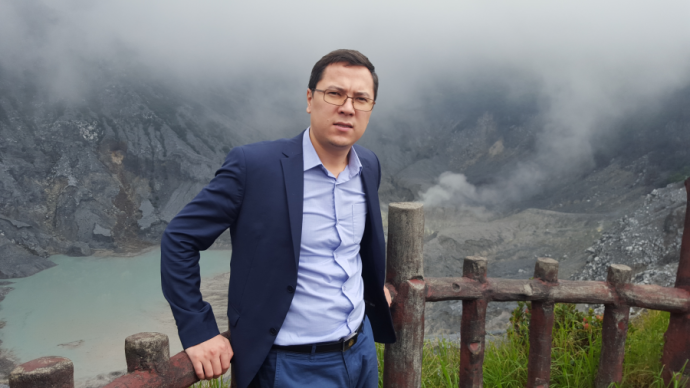

Kushtarbek Shamshidov graduated the OSCE Academy in 2010. In 2012 he received a MAS European Scholarship for Central Asia to study in Geneva. Today Kushtarbek is one of the most succesfull graduates of the OSCE Academy, who is a Third Secretary/Consul at the Embassy of the Kyrgyz Republic in Kuala Lumpur.
1. Kushtar, at what age did you start realizing that you would like to serve in the government of your country?
In 2012. That year I received a European Scholarship for Central Asia that was offered exclusively to the OSCE Academy’s graduates to study at the University of Geneva and the Geneva Centre for Security Policy (GCSP). One day Mr Ruslan Kazakbayev, then the Minister of Foreign Affairs of Kyrgyz Republic has visited the GCSP, where I was doing my research. As I was the only researcher from the Kyrgyz Republic, the head of the GCSP arranged a meeting between the Minister R. Kazakbayev and me. After a pleasant conversation, the Minister advised me to consider working in the Ministry of Foreign Affairs upon my return to Kyrgyzstan. Since then, I began to look seriously into working in diplomacy.
2. What role did the OSCE Academy play in your professional development?
The experience and knowledge gained at the OSCE Academy, determined my professional future. I remember, that I’ve never missed a single lecture on the subject "China - Central Asia", which was delivered by former Foreign Minister Dr Muratbek Imanaliev. Then, in 2010, in connection with his appointment as the Secretary-General of the SCO, above-mentioned lecture was continued by Mr Erlan Abdyldaev, current Minister of Foreign Affairs of the Kyrgyz Republic and one of the leading kyrgyz experts on China. The theoretical and practical knowledge gained from practicing experts on China - Central Asian relations helped me to understand current issues in our region more accurately.
At the end of the second semester under the personal supervision of Mr Erlan Abdyldaev I worked on my master's thesis "The SCO and Central Asia." Fortunately, with the support of my supervisor Mr Erlan Abdyldaev and Dr Maksim Ryabkov, then Director of the OSCE Academy, and due to the topic of my thesis and knowledge of Chinese language, I was given the opportunity to undertake internship at the Secretariat of the Shanghai Cooperation Organization (SCO) in Beijing.
My experience as an intern at the Secretariat of the SCO has become a major advantage in passing to the basis of the Master's programme on "European and international security," of the University of Geneva on the Scholarship Programme by the GCSP.
Education in the excellent academic atmosphere of the OSCE Academy, the experience gained during the internship in Beijing and studying at the University of Geneva and GCSP, altogether has played a fundamental role in choosing my profession.
3. What is the most challenging part of being a representative of the Public Sector?
The challenging part probably is that the results of your work in the public sector are not as obvious as in the private sector. Another challenge would be accountability before the people you serve and in international diplomacy you should always keep in mind that firstly you are representing your country and then yourself.
4. Many young people say that being a public servant means, you have to be ready to work 24/7 and there is no time left for personal life. Do you agree with this statement?
I partially agree, but if you want to have a personal life, you will have it and you will find time for it despite your busy schedule. I do remember that when we studied at the OSCE Academy we had chance to take some short-term courses such as Time management and communications skills. For example, even though the Time management was not a major subject, it contained many practical implications both for professional and daily life, which I use up top now.
5. Where do you see yourself in ten years?
The Ministry of Foreign Affairs offers me plenty of opportunities to further develop my skills and there are many professionals in Kyrgyz diplomacy I can really learn from. For the next coming years, I would like to use these opportunities to be the best at what I do in order to take on more challenges and be useful for the country, where I belong.
6. What can you advice those who want/plan to work in the government?
From my own experience, I would offer three basic suggestions:
First, after graduation, it is always hard to make a right choice and you are always in doubt. In this situation, there is no need to rush and if time permits, take the opportunity to do internship before taking the final decision. Internship gives you the chance to see the real picture from inside.
Second, sometimes the most important is the financial part of the offer. As we all know, at the moment the Central Asian region in terms of the government employers’ salary leaves a lot to be desired. Therefore, a newcomer should settle his financial problems before entering the public sector or be ready to face the challenges.
Third, many would agree that work should bring joy and satisfaction. Moreover, it is important to feel it as early as possible. In my case, as I suggested above, it was essential to find out about it during my internship. After few weeks, I have realized that I am surrounded by patriotic, professional, intellectual and open-minded people, who gave me more energy and inspiration to continue my professional path.